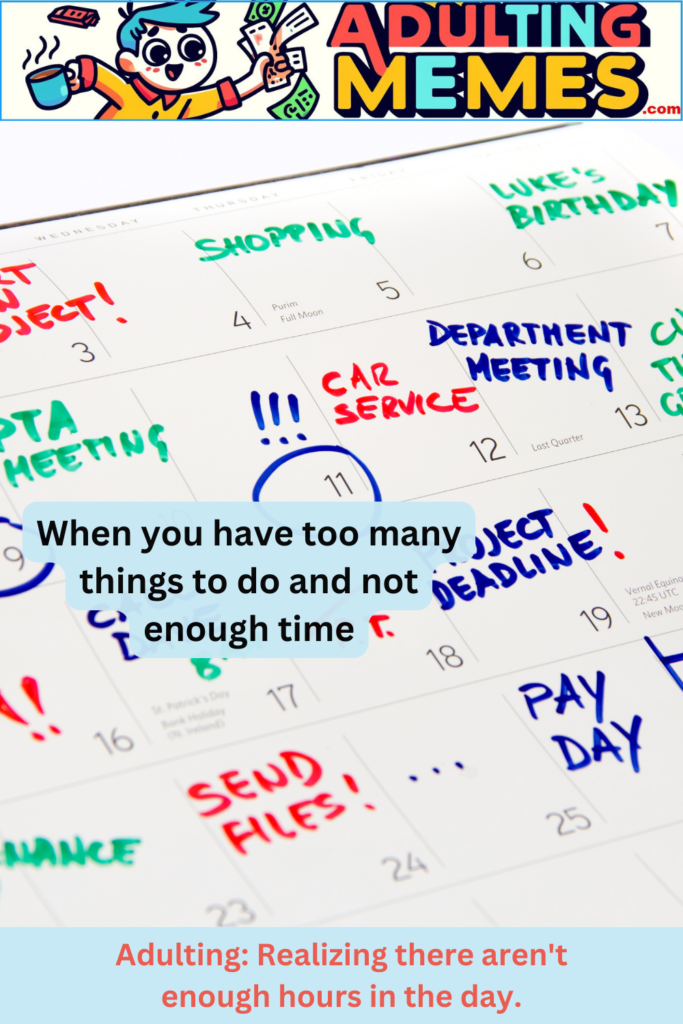 How to Manage Your Time: Tips for When You Have Too Much to Do
How to Manage Your Time: Tips for When You Have Too Much to Do
As a young adult, it often feels like there aren’t enough hours in the day to get everything done. Between work, school, social commitments, and personal tasks, managing your time can seem like an impossible challenge. If you frequently find yourself overwhelmed by a packed schedule, here are some tips to help you better manage your time and stay on top of your responsibilities.
Why Time Management is Challenging
- Multiple Commitments: Balancing work, school, and personal life can lead to a hectic schedule.
- Distractions: Social media, notifications, and other distractions can eat up your time.
- Procrastination: Putting off tasks can lead to a last-minute rush and added stress.
- Poor Planning: Without a clear plan, it’s easy to lose track of time and priorities.
Tips for Effective Time Management
Here are practical strategies to help you manage your time more effectively:
- Prioritize Tasks: Start by identifying your most important tasks. Use a prioritization method like the Eisenhower Matrix to categorize tasks by urgency and importance.
- Create a Schedule: Use a planner or digital calendar to schedule your tasks and commitments. Block out specific times for each task and stick to your schedule as much as possible.
- Set Realistic Goals: Break larger tasks into smaller, manageable steps. Set achievable goals for each day to avoid feeling overwhelmed.
- Eliminate Distractions: Identify your biggest distractions and find ways to minimize them. This might mean turning off notifications, setting specific times for checking email, or creating a dedicated workspace.
- Use Time Management Techniques: Techniques like the Pomodoro Technique (working for 25 minutes and then taking a 5-minute break) can help you stay focused and productive.
- Delegate When Possible: Don’t be afraid to delegate tasks to others when appropriate. Sharing responsibilities can free up your time for more important tasks.
- Learn to Say No: It’s okay to decline additional commitments if your schedule is already full. Prioritize your time and energy on what truly matters.
- Take Care of Yourself: Make time for self-care, including adequate sleep, exercise, and relaxation. Taking care of your physical and mental health can improve your productivity.
Tools and Resources for Time Management
To help you stay organized and on track, consider using the following tools and resources:
- To-Do Lists: Use a to-do list app or a simple notebook to keep track of tasks and check them off as you complete them.
- Calendars: Digital calendars like Google Calendar can help you schedule and sync your commitments across devices.
- Productivity Apps: Apps like Trello, Asana, and Todoist can help you manage projects and tasks.
- Timers and Alarms: Set timers and alarms to remind you of important tasks and deadlines.
- Time Tracking Tools: Tools like Toggl can help you track how you spend your time and identify areas for improvement.
Long-Term Strategies for Better Time Management
For long-term success, consider incorporating these strategies into your routine:
- Regularly Review Your Schedule: Take time each week to review your schedule and adjust as needed. This helps you stay on top of your commitments and plan for the week ahead.
- Reflect and Adjust: Periodically reflect on your time management practices. Identify what’s working and what’s not, and make adjustments accordingly.
- Set Boundaries: Establish clear boundaries between work, school, and personal time. This helps prevent burnout and ensures you have time for relaxation and hobbies.
Effective time management is a key skill for successful adulting. By prioritizing tasks, creating a schedule, and minimizing distractions, you can better manage your time and reduce stress. Remember, the goal is to work smarter, not harder. With these strategies, you can take control of your schedule and make the most of each day.
By following these tips, you’ll be better equipped to handle a busy schedule and find balance in your daily life. No more feeling overwhelmed—just effective time management!
